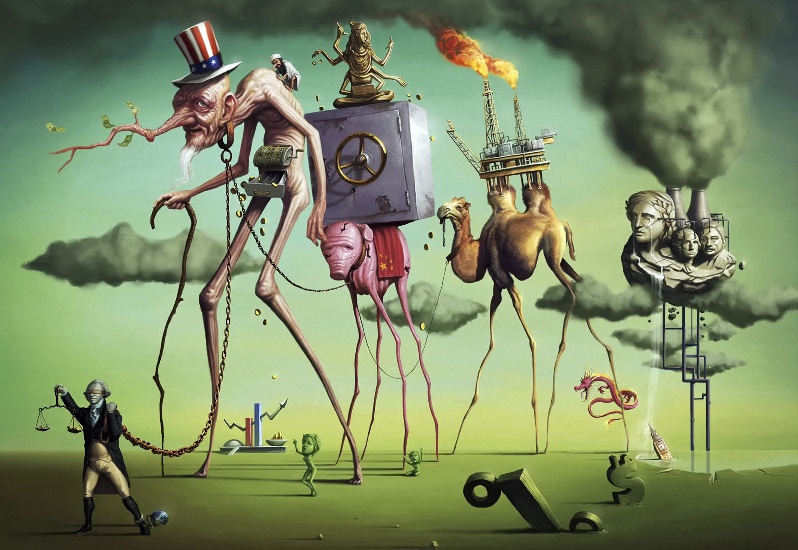
Geoffrey M. Hodgson
In terms of basic assumptions, Marxism has more in common with some prominent versions of so-called “neoliberalism” than is generally understood. Obviously, Marxism is opposed to a market economy. But some core ideas by Karl Marx and Frederick Engels are remarkably similar to those of some so-called “neoliberals”. For example, Marx’s definition of property resembles that of Ludwig von Mises.
But the parallels go much further, and are disturbing in their consequences. They concern the independence of the legal system and the nature and legitimation of democracy. They also concern the viability of civil society and the autonomy of personal and social life.
The argument here shows that liberalism – both historically and currently – is very different from some modern versions of “neoliberalism”. This “neoliberalism” is theoretically closer to Karl Marx than to Thomas Paine or John Stuart Mill.
Marxism undermines the autonomy of politics and civil society
The Marxian analysis of capitalism treats law and the state as an expression of class interests, which in turn are grounded on “economic relations”. Hence, for Marx, law and the state “originate in the material conditions of life“. They are part of the “superstructure” built upon the “economic base”.
The Marxist analytical reduction of everything to economics does not stop there. Consider the notion of civil society.
Civil society generally connotes a realm of free, partly self-organising, property-owning citizens, who interact under the rule of the state and its laws. In most accounts it includes private business and markets, but it is not reducible to them. It also embraces many forms of social association (including recreation, religion and philanthropy) that are not driven by business interests.
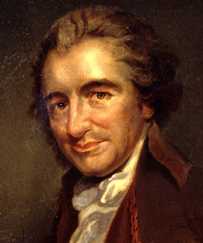
Thomas Paine
Distinctions between civil society and the state, and between civil society and the narrower world of trade and business, were developed by Enlightenment liberal writers such as Adam Smith, Adam Ferguson, Thomas Paine, Alexis de Tocqueville and others. They are crucial for modern liberal theory.
In its analysis of capitalism, Marxism made the state, law, politics and civil society all analytically subservient to markets and business.
These may be regarded as extreme formulations within Marxism. Certainly there are more sophisticated treatments by Marxists of civil society and the state, not least by Antonio Gramsci. But Marxism is severely impaired by the words of its founders.
The above extracts concern the Marxian analysis of capitalism, not its vision of an ideal society, which of course is strikingly different from that of (neo)liberals. While the Marxian analysis of capitalism undermines the conceptual distinction between civil society and the state – by making them both subservient to economic relations – Marxian politics also dissolves it in practice.
In his early tract On the Jewish Question, Marx argued that civil society and political society should become one and the same. In practice, under socialism, once much of the economy becomes a state bureaucracy. With private association under restriction, the scope of civil society is much diminished.
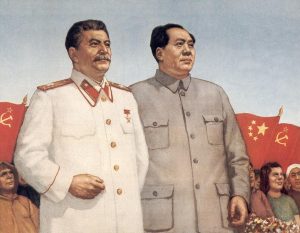 The conceptual and practical degradation of civil society is but one of the roots of totalitarianism within Marxism. Other sources are discussed elsewhere. The smothering of civil society within the party-state makes opposition more difficult and paves the way to dictatorship – a process witnessed in all Marxist regimes, from Russia to Venezuela.
The conceptual and practical degradation of civil society is but one of the roots of totalitarianism within Marxism. Other sources are discussed elsewhere. The smothering of civil society within the party-state makes opposition more difficult and paves the way to dictatorship – a process witnessed in all Marxist regimes, from Russia to Venezuela.
The reclamation of civil society by Eastern European dissidents
Long before the fall of the Berlin Wall in 1989, underground opposition groups had developed in several Soviet Bloc countries. After the crushing of the Hungarian Uprising in 1956, and after the Soviet invasion of Czechoslovakia in 1968, opposition to the Marxist party-state became most developed in Poland.
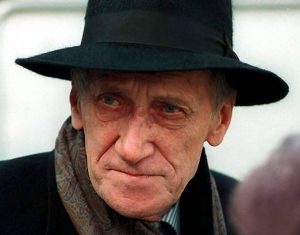
Leszek Kolakowski
In 1971 the Polish intellectual Leszek Kołakowski wrote his Theses on Hope and Despair. These were circulated illegally in his home country.
Kołakowski complained that the Soviet-style regime had “monopolistic power” that impelled “the atomization of society and the destruction of all forms of social life not prescribed by the ruling apparat.” He called for a pluralist society with genuine freedom of information, discussion and association.
 Subsequently, other Eastern European intellectuals such as Jacques Rupnik called for “the rebirth of civil society”. After the formation of the mass trade union movement Solidarity in Poland in 1980, still more voices were added. The Hungarian Andrew Arato wrote in 1981 of the new dissident wave:
Subsequently, other Eastern European intellectuals such as Jacques Rupnik called for “the rebirth of civil society”. After the formation of the mass trade union movement Solidarity in Poland in 1980, still more voices were added. The Hungarian Andrew Arato wrote in 1981 of the new dissident wave:
“one point unites them all: the viewpoint of civil society against the state – the desire to institutionalize and preserve the new level of social independence.”
Before its unexpected elevation to political power in 1989, Solidarity saw itself as essentially a movement for the “self-defence” of civil society against totalitarian power.
But while the dissidents drew on Enlightenment and liberal thought, their political philosophy was often underdeveloped. After 1989, many former dissidents became influenced by extreme forms of market libertarianism. But given the parallels – explored below – between this “neoliberalism” and Marxist thought, there was more continuity in their thinking than immediately meets the eye.
Market universalism
To understand the connection between “neoliberalism” and Marxism we need first to address a much broader phenomenon within social science.
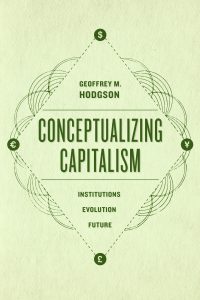 There is a widespread tendency to use the language of trade and markets to describe phenomena that are neither traded nor markets. I gave some examples in my Conceptualizing Capitalism book. I here call it market universalism.
There is a widespread tendency to use the language of trade and markets to describe phenomena that are neither traded nor markets. I gave some examples in my Conceptualizing Capitalism book. I here call it market universalism.
Consider the notion of a “market for ideas”, which can be found in the writings of Nobel Laureate Ronald Coase. He did not refer to intellectual property but to conversation and freedom of expression.
Douglass North, another Nobel Laureate, wrote of “political markets”. He was not referring to vote-buying (in countries like India) or political bribery, but to the general process of multi-party competition in a democracy.
In a paper published in 1988, Bruce Benson and Eric Engen envisioned “the legislative process as a market for laws” where interest groups “pay” legislators for laws as “products”.
By minimal criteria, none of these is a market. Rules concerning contracts, enforcement and property rights are lacking.
For example, the ordinary communication or debating of ideas does not involve enforceable contracts. Generally, conversation is not an intentional transfer of property rights.
Similarly, if we vote for a politician or a party that does not typically amount to an enforceable agreement. Competition between politicians or parties for votes or power is not a contest for contracts under any established system of contractual rules.
Likewise, with the supposed “market for laws”, in reality there are rarely any enforceable contracts between interest groups and legislators.
There is a further problem. What would be the system of rules under which these supposed “contracts” between legislators and interest groups are formed and enforced? Hence a “market for laws” would require supra-legal institutions with their own (legal or other) rules. We would need markets for markets-for-laws, or markets for meta-rules.
This reveals a problem of an infinite regress, showing that not everything can be placed on a market. My Conceptualizing Capitalism book gives further reasons why markets cannot be universal. There will always be missing markets.
Market universalism and “neoliberalism”
Although market universalism may be dismissed as the harmless use of metaphor, it contains dangerous policy temptations.
Making everything a market denies the autonomy of law and politics: everything is subsumed within the market zone. All forms of association are regarded as market-like or contractual arrangements. Legal and political relations or rights are reduced to the “economic” facts of possession or control.
The temptation is to downgrade all non-commercial justifications for democracy, law or social life. Everything is forced into the conceptual straitjacket of property and contract, and evaluated in terms of profit and loss.
Previous liberal thinkers had defended rights to private property, other human rights, plus institutions such as democracy. By contrast, market universalism can highlight control over property first, on the grounds that it is the foundation of all other rights and liberties. Property moves from being a necessary but insufficient condition of liberty, to being necessary and sufficient for the same.
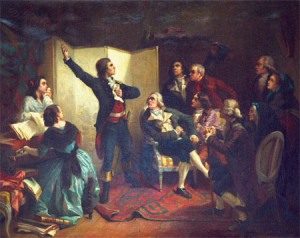 This transforms the Enlightenment argument that the government must be legitimated by representative democracy, rather than by tradition or divine rule. The “political market” makes democracy a market, and market-like criteria become the overriding source of legitimation for everything.
This transforms the Enlightenment argument that the government must be legitimated by representative democracy, rather than by tradition or divine rule. The “political market” makes democracy a market, and market-like criteria become the overriding source of legitimation for everything.
Furthermore, democracy may be seen as secondary or expedient, especially when property or markets are perceived as being under threat. By treating democracy as another market, a temptation is to regard markets and property as generally more important or supreme than democracy.
Consequentially, market universalism enables something very different from other forms of liberalism, and it involves a radically modified conceptual foundation. One may be tempted to call it neoliberalism.
This is the label suggested by Philip Mirowski, who addressed what he called the Mont Pèlerin “thought collective”. In a perceptive essay on this influential intellectual movement, which involved Friedrich Hayek, Milton Friedman, Ludwig von Mises and others, Mirowski identified several of its traits including the following:
“Skepticism about the lack of control of democracy is offset by the persistent need to provide a more reliable source of popular legitimacy for the neoliberal market state. Neoliberals seek to transcend the intolerable contradiction by treating politics as if it were a market and promoting an economic theory of democracy.”
Foundations of anti-democratic authoritarianism
We can now see what Marxists and market universalists have in common. They all look upon capitalism as system where everything is reducible to a market.
For Marxists, this means that civil society is nothing more than the sphere of business and individual greed. In addition, the political and legal spheres are simply reflections of these business interests.
A policy consequence – after the socialist revolution – is to destroy civil society and absorb it into politics and the state. This forms part of the Marxist foundation for totalitarianism.
Of course, for “neoliberals”, markets are always beneficial. But the problem is much more serious than their ever-familiar agoraphilia.
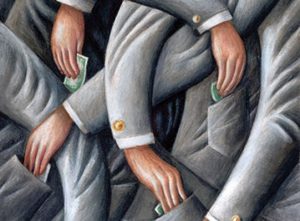 Through notions such as “political markets” and “markets for laws”, market universalist “neoliberals” reduce the state and its legal system to a grand marketplace. The state and law become additional markets alongside others. The policy temptation is the practical marketization of the state and the doctrinal denial of the autonomy of politics.
Through notions such as “political markets” and “markets for laws”, market universalist “neoliberals” reduce the state and its legal system to a grand marketplace. The state and law become additional markets alongside others. The policy temptation is the practical marketization of the state and the doctrinal denial of the autonomy of politics.
Once politics and all civil society are seen through the lenses of trade and markets, then the basic elements of property and contract become supreme. Instead of being a necessary but insufficient precondition of liberty, property becomes both necessary and sufficient.
This transforms the Enlightenment argument that the government must be legitimated by representative democracy, rather than by divine rule. The “political market” makes democracy a market, and this becomes the overriding source of legitimation.
Consequently, democracy becomes secondary or expedient, especially when property or markets are perceived as being under threat. By treating democracy as another market, a temptation is to regard markets and property as generally more important or supreme than democracy.
Leading “neoliberals” like von Mises and Hayek have been described as classical liberals. But their views are a departure in important respects from the Enlightenment liberalism of the eighteenth and nineteenth centuries, and from other more recent currents of liberal thinking. In some important respect they are closer to Karl Marx than John Stuart Mill.
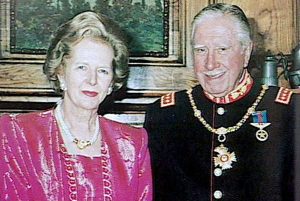
Margaret Thatcher and Augusto Pinochet
Their supreme emphasis on property rights explains why some “neoliberals” have dallied with dictators. For example, in a book originally published in 1927, von Mises praised fascism as “an emergency makeshift” that “has, for the moment, saved European civilization”. Hayek was notoriously silent about the human rights violations in Chile under the dictator Pinochet. These fascist or dictatorial regimes were seen by them as saviours of private property.
Conclusion: liberalism is not “neoliberalism”
Despite their opposed policy stances, Marxism and the type of market-universalist “neoliberalism” discussed here have similarities at their theoretical foundations. While Marxism reduces the analysis of civil society and politics to an economistic world dominated by self-seeking egoists, this “neoliberalism” does exactly the same.
Within this version of “neoliberalism”, everything is legitimated by free contract in unfettered markets in all spheres of human interaction, including within the state itself. Like Marxism, it reduces everything to economics.
This entails a radical break from other forms of liberalism, and from all other doctrines that recognise the relative autonomy of the political and legal spheres from the economy and from civil society.
2 September 2017
Minor edits – 8, 10 September 2017
This book elaborates on some of the political issues raised in this blog:
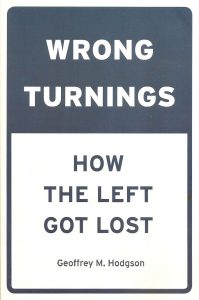
Published by University of Chicago Press in January 2018
References
Arato, Andrew and Cohen, Jean (1992) Civil Society and Democratic Theory (Cambridge, MA: MIT Press).
Benson, Bruce L. and Engen, Eric M. (1988) ‘The Market for Laws: An Economic Analysis of Legislation’, Southern Economic Journal, 54(3), January, pp. 732-745.
Caldwell, Bruce J. and Montes, Leonidas (2015) ‘Friedrich Hayek and his Visits to Chile’, Review of Austrian Economics, 28(3), pp. 261-309.
Cohen, Jean (1982) Class and Civil Society: The Limits of Marxian Critical Theory (Oxford, Martin Robertson).
Hodgson, Geoffrey M. (2015) Conceptualizing Capitalism: Institutions, Evolution, Future (Chicago: University of Chicago Press).
Hodgson, Geoffrey M. (2017) Wrong Turnings: How the Left Got Lost (Chicago: University of Chicago Press, forthcoming).
Keane, John (ed.) (1988) Civil Society and the State (London: Verso).
Keane, John (1995) Tom Paine: A Political Life (London: Bloomsbury).
Keane, John (1998) Civil Society: Old Images, New Visions (Cambridge: Polity).
Kumar, Krishan (1993) ‘Civil Society: An Inquiry into the Usefulness of an Historical Term’, British Journal of Sociology, 44(3), September, pp. 375-395.
Mirowski, Philip and Plehwe, Dieter (eds) (2015) The Road from Mont Pèlerin: The Making of the Neoliberal Thought Collective, paperback edition (Cambridge MA: Harvard University Press). (Quote from p. xvii.)
Mises, Ludwig von (1985) Liberalism in the Classic Tradition. Translated from the German edition of 1927 (Irvington, NY: Foundation for Economic Education).
Polan, Anthony J. (1984) Lenin and the End of Politics (London: Methuen).
Venugopal, Rajesh (2015) ‘Neoliberalism as a Concept’, Economy and Society, 44(2), pp. 165-87. http://www.tandfonline.com/doi/abs/10.1080/03085147.2015.1013356.


 The conceptual and practical degradation of civil society is but one of the roots of totalitarianism within Marxism.
The conceptual and practical degradation of civil society is but one of the roots of totalitarianism within Marxism. 
 Subsequently, other Eastern European intellectuals such as Jacques Rupnik called for “the rebirth of civil society”. After the formation of the mass trade union movement Solidarity in Poland in 1980, still more voices were added. The Hungarian Andrew Arato wrote in 1981 of the new dissident wave:
Subsequently, other Eastern European intellectuals such as Jacques Rupnik called for “the rebirth of civil society”. After the formation of the mass trade union movement Solidarity in Poland in 1980, still more voices were added. The Hungarian Andrew Arato wrote in 1981 of the new dissident wave: There is a widespread tendency to use the language of trade and markets to describe phenomena that are neither traded nor markets. I gave some examples in my
There is a widespread tendency to use the language of trade and markets to describe phenomena that are neither traded nor markets. I gave some examples in my  This transforms the Enlightenment argument that the government must be legitimated by representative democracy, rather than by tradition or divine rule. The “political market” makes democracy a market, and market-like criteria become the overriding source of legitimation for everything.
This transforms the Enlightenment argument that the government must be legitimated by representative democracy, rather than by tradition or divine rule. The “political market” makes democracy a market, and market-like criteria become the overriding source of legitimation for everything. Through notions such as “political markets” and “markets for laws”, market universalist “neoliberals” reduce the state and its legal system to a grand marketplace. The state and law become additional markets alongside others. The policy temptation is the practical marketization of the state and the doctrinal denial of the autonomy of politics.
Through notions such as “political markets” and “markets for laws”, market universalist “neoliberals” reduce the state and its legal system to a grand marketplace. The state and law become additional markets alongside others. The policy temptation is the practical marketization of the state and the doctrinal denial of the autonomy of politics.

Pingback: My long journey from socialism to liberalism – New Politics
Pingback: Neoliberalism versus Liberal Solidarity – New Politics